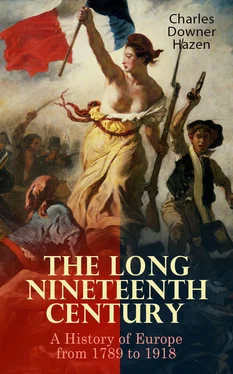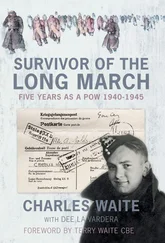It has been estimated that during the Revolution a hundred and fifty thousand people left France in this way. Many of them went to the little German states on the eastern frontier. There they formed an army of perhaps twenty thousand men. The Count of Provence, brother of Louis XVI, was the titular leader and claimed that he was the Regent of France on the ground that Louis XVI was virtually a prisoner. The emigres ceaselessly intrigued in the German and other European courts, trying to instigate their rulers to invade France, particularly the rulers of Austria and Prussia, important military states, urging that the fate of one monarch was a matter that concerned all monarchs, for sentimental reasons and for practical, since, if the impious revolution triumphed in France, there would come the turn of the other intrigues of kings for similar treatment at the hands of rebellious subjects. In 1791 the emigres succeeded in inducing the rulers of Austria and Prussia to issue the Declaration of Pillnitz announcing that the cause of Louis XVI was the cause of all the monarchs of Europe. This Declaration was made conditional upon the cooperation of all the countries and, therefore, it was largely bluster and had no direct importance. It was not sufficient to bring on war. But it angered France and increased suspicion of the King. The Legislative Assembly passed two decrees, one declaring that the Count of Provence would be deprived of his eventual rights to the throne if he did not return to France within two months, against the the other declaring that the property of the emigres would be confiscated and that they themselves would be treated as enemies, as guilty of treasonable conspiracy, if their armaments were not dispersed by January 1, 1792; also stating that the French princes and public officials who had emigrated should be likewise regarded as conspiring against the state and would be exposed to the penalty of death, if they did not return by the same date.
Louis XVI vetoed these decrees. He did, however, order his two brothers to return to France. They refused to obey out of "tenderness" for the King. The Count of Provence, who had a gift for misplaced irony and impertinence, saw fit to exercise it in his reply to the Assembly's summons. If this was not precisely pouring oil upon troubled waters, it was precisely adding fuel to a mounting conflagration, perhaps a natural mode of action for those who are dancing on volcanoes. Prudent people prefer to do their dancing elsewhere.
More serious were the war clouds that were rapidly gathering. At the beginning of the Revolution nothing seemed less likely than a conflict between France and Europe. France was pacifically inclined, and there were no outstanding subjects of dispute. Moreover the rulers of the other countries were not at all anxious to intervene. They were quite willing to have France occupied exclusively with domestic problems, as thus the field would be left open for their intrigues. They were meditating the final partition of Poland and wished to be left alone while they committed that crowning iniquity. But gradually they came to see the menace to themselves in the new principles proclaimed by the French, principles of the sovereignty of the people and of the equality of all citizens. Their own subjects, particularly the peasants and the middle classes, were alarmingly enthusiastic over the achievements of the French. If such principles should inspire the same deeds as in France, the absolute monarchy of Louis XVI would not be the only one to suffer a shock.
Just as the sovereigns were being somewhat aroused from this complacent indifference in regard to their neighbor's principles, a change going on in France itself, where certain parties were beginning to claim their duty to share their happiness with other peoples, in other words, to conduct propaganda for their ideas outside of France. They were talking of the necessity of warring against tyrants, and of liberating peoples still enslaved.
Thus on both sides the temper was becoming warlike. When such a mood prevails it is never difficult for willing minds to find sufficient pretexts for an appeal to arms. Moreover each side had a definite and positive grievance. France, as we have seen, viewed with displeasure and concern the formation of the royalist armies on her eastern borders, with the connivance, or at least the consent, of the German princes. On the other hand the German Empire friction had a direct grievance against France. When Alsace became French in the seventeenth century, a number of the German German princes possessed lands there and were, in fact, feudal lords. They still remained princes of the German Empire, and their territorial rights were guaranteed by the treaties. Only they were at the same time vassals of the King of France, doing homage to him and collecting feudal dues, as previously. When the French abolished feudal dues as we have seen, August 4, 1789, they insisted that these decrees applied to Alsace as well as to the rest of France. The German princes protested and asserted that the decrees were in violation of the Treaties of Westphalia. The German Diet espoused their cause. The Constituent Assembly insisted upon maintaining its laws, in large measure, but offered to modify them.
The Diet refused, demanding the revocation of the obnoxious laws and the restoration of the feudal dues in Alsace. The controversy was full of danger for the reason that there were many people, both in France and in the other countries, who were anxious for war and who would use any means they could to bring it about. The gale was gathering that was to sweep over Europe in memorable devastation for nearly a quarter of a century.
The Legislative Assembly was composed of inexperienced men, because of the self-denying ordinance passed in the closing hours of the Constituent Assembly. Yet this Assembly was vested by the new Constitution with powers vastly overshadowing those left with the King. Nevertheless it was suspicious of him, as it had no control over the ministry and as it was the executive that directed the relations with foreign countries.
There were, moreover, certain new forces in domestic politics of which the world was to hear much in the coming months. Certain political clubs began to loom up threateningly as possible rivals even of the Assembly. The two most conspicuous were political - the Jacobin and the Cordelier clubs. These had originated clubs at the very beginning of the Revolution, but it was under the Legislative Assembly and its successor that they showed their power.
The Jacobin Club was destined to the greater notoriety. It was composed of members of the Assembly and of outsiders, citizens of Paris, As a political club the members held constant sessions and debated with great zeal and freedom the questions that were before the Assembly. Its most influential leader at this time was Robespierre, a radical democrat but at the same time a convinced monarchist, a vigorous opponent of the small republican party which had appeared momentarily at the time of the epoch-making flight to Varennes. The Jacobin Club grew steadily more radical as the Revolution progressed and as its more conservative members dropped out or were eliminated. It also rapidly extended its influence over all France. Jacobin clubs were founded in over 2,000 cities and villages. Affiliated with the mother club in Paris, they formed a vast network, virtually receiving orders from Paris, developing great talent for concerted action. The discipline that held this voluntary organization together was remarkable and rendered it capable of great and decisive action. It became a sort of state within the state and, moreover, within a state which was as decentralized and ineffective as it was itself highly centralized and rapid and thorough in its action. The Jacobin Club gradually became a rival of the Assembly itself and at times exerted a preponderant influence upon it, yet the Assembly was the legally constituted government of all France.
Читать дальше












